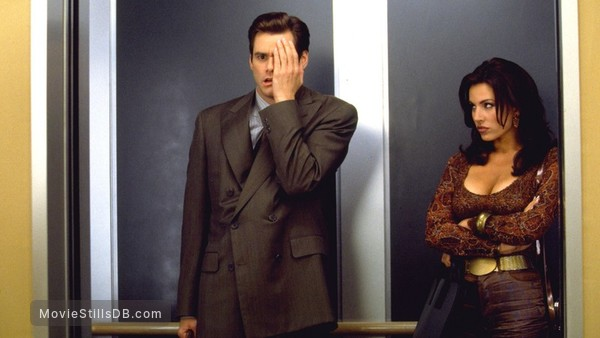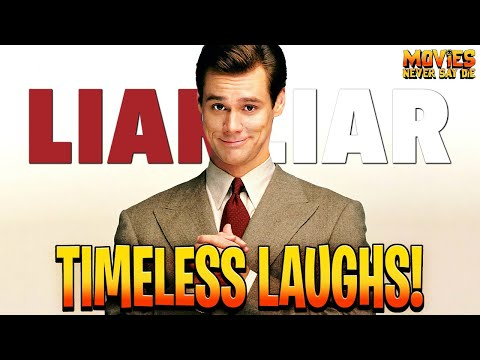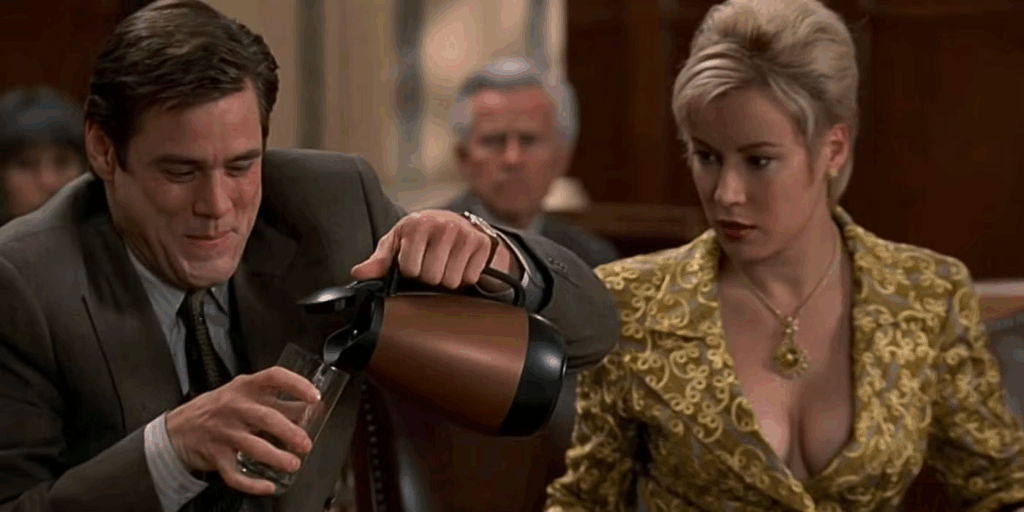Krista Allen in ‘Liar Liar’ (1997)

Krista Allen in Liar Liar (1997): A Breakout Role in a Comedy Classic
Liar Liar (1997), directed by Tom Shadyac and starring Jim Carrey, remains one of the most beloved comedies of the 1990s, celebrated for its hilarious premise and Carrey’s iconic performance. While Carrey’s portrayal of the compulsively truthful lawyer Fletcher Reede dominates the spotlight, Krista Allen’s supporting role as the provocative “Woman in Elevator” marks a memorable moment in the film and a significant early milestone in her career. This article offers a comprehensive exploration of Krista Allen’s contribution to Liar Liar, delving into the film’s context, her role, the movie’s themes, production details, critical reception, and cultural impact, while highlighting how this brief but iconic appearance helped launch Allen’s trajectory in Hollywood.

The Context of Liar Liar: A Comedy Gem of the 1990s
Released on March 21, 1997, Liar Liar is a fantasy-comedy film that capitalizes on Jim Carrey’s unparalleled physical comedy and expressive charisma, cementing his status as a box-office juggernaut following hits like Ace Ventura: Pet Detective (1994) and The Mask (1994). The film follows Fletcher Reede, a fast-talking, morally flexible lawyer whose habitual lying jeopardizes his relationship with his ex-wife, Audrey (Maura Tierney), and their son, Max (Justin Cooper). When Max makes a birthday wish that his father cannot lie for 24 hours, Fletcher is magically compelled to tell the truth, leading to chaotic and hilarious consequences in his personal and professional life.
The movie’s blend of slapstick humor, heartfelt family drama, and a touch of supernatural whimsy resonated with audiences, grossing over $302 million worldwide on a $45 million budget. Its enduring popularity is evident in its frequent cable TV airings and cultural references, with lines like “The truth shall set you free!” becoming part of the 1990s comedy lexicon. Within this vibrant ensemble, Krista Allen’s brief but unforgettable scene stands out as a quintessential moment of the film’s irreverent humor.

Krista Allen’s Role: The “Woman in Elevator” Scene
Krista Allen, then a 25-year-old actress early in her career, appears in Liar Liar as the unnamed “Woman in Elevator,” a character whose brief interaction with Fletcher Reede encapsulates the film’s comedic premise. In the scene, Fletcher, unable to lie due to Max’s wish, enters an elevator with Allen’s character, a confident and alluring woman. When she casually remarks, “Everybody’s been real nice,” Fletcher blurts out an unfiltered and risqué response, leading to a shocked but amused reaction from her character. The exchange, lasting mere seconds, is one of the film’s most quoted moments, showcasing Carrey’s manic energy and Allen’s ability to hold her own against a comedy titan.
Allen’s performance is notable for its subtle comedic timing and expressive physicality. Her character’s playful demeanor and quick reaction to Fletcher’s outburst amplify the scene’s humor, making it a standout in a film packed with memorable gags. While her role is small, it demonstrates her charisma and screen presence, qualities that would define her later career in both television and film. The scene also reflects the 1990s comedy trope of brief, flirtatious encounters, yet Allen’s delivery ensures the character feels vibrant rather than one-dimensional.
At the time of filming, Allen was relatively unknown, having appeared in minor roles on shows like Days of Our Lives and The Bold and the Beautiful. Her casting in Liar Liar came through a competitive audition process, where her natural charm and ability to match Carrey’s energy won over director Tom Shadyac. This role, though brief, served as a springboard for Allen, leading to more prominent parts in projects like Baywatch Hawaii and What About Brian.

Themes of Liar Liar: Truth, Family, and Redemption
Liar Liar is more than a vehicle for Carrey’s comedic antics; it explores universal themes that give the film its emotional depth. The central theme of truth underscores Fletcher’s journey, as his forced honesty exposes the consequences of his lies, both in his career and his relationship with Max. The film uses humor to illustrate how truth, while disruptive, can lead to personal growth and reconciliation, a message that resonates across generations.
Family is another core theme, with Fletcher’s strained bond with Max and Audrey driving the narrative. Max’s wish reflects his longing for a father he can trust, and Fletcher’s chaotic day of truth-telling ultimately leads him to prioritize his son over his selfish ambitions. This heartfelt arc, balanced with the film’s humor, makes Liar Liar a family-friendly comedy with lasting appeal.
Redemption ties these themes together, as Fletcher seeks to repair his fractured relationships and reclaim his integrity. Allen’s scene, while comedic, indirectly supports this arc by showcasing Fletcher’s inability to filter his thoughts, a symptom of the truth that forces him to confront his flaws. The film’s blend of slapstick and sincerity ensures that its themes remain accessible, contributing to its status as a feel-good classic.

Production: Crafting a Comedy Masterpiece
Liar Liar was produced by Imagine Entertainment and Universal Pictures, with a script by Paul Guay and Stephen Mazur. Director Tom Shadyac, fresh off Ace Ventura, tailored the film to Carrey’s strengths, allowing him to improvise many of his lines and physical gags. The elevator scene with Krista Allen, for instance, reportedly involved multiple takes to capture Carrey’s spontaneous energy and Allen’s reactions, with Shadyac encouraging her to lean into the character’s playful confidence.
Filming took place in Los Angeles in 1996, with sets designed to reflect Fletcher’s slick legal world and cozy family life. The elevator scene was shot on a practical set, with Allen’s costume—a form-fitting dress—chosen to emphasize the character’s boldness while keeping the tone lighthearted. Cinematographer Russell Carpenter, who later won an Oscar for Titanic (1997), used bright, clean visuals to enhance the film’s comedic energy, while John Debney’s upbeat score amplified its whimsical vibe.
The production budget of $45 million was modest for a star-driven comedy, reflecting Carrey’s willingness to take a lower upfront salary in exchange for profit participation—a savvy move given the film’s massive success. Allen’s casting was part of a broader effort to surround Carrey with talented supporting actors, including Maura Tierney, Cary Elwes, and Jennifer Tilly, ensuring that every scene sparkled with chemistry.

Critical Reception: A Hit with Audiences and Critics
Upon release, Liar Liar was a critical and commercial triumph, earning a 83% approval rating on Rotten Tomatoes based on 71 reviews. Critics praised Carrey’s “wildly exuberant” performance, with Roger Ebert noting, “Carrey’s so good at what he does that he can make you laugh at things that aren’t even funny.” The film’s blend of humor and heart was lauded, though some reviewers, like Janet Maslin of The New York Times, felt the sentimental ending was overly conventional.
Krista Allen’s role, while minor, was often highlighted in reviews for its comedic impact. Entertainment Weekly described the elevator scene as “a perfect encapsulation of Carrey’s unhinged brilliance,” with Allen’s reaction earning praise for its pitch-perfect timing. The film’s broad appeal led to a box-office run that saw it top the U.S. charts for four weeks, outperforming competitors like The Devil’s Own and Selena.
Over time, Liar Liar has maintained its status as a comedy classic, with IMDb users giving it a 6.9/10 rating and ranking it among Carrey’s best films. Allen’s scene remains a fan favorite, frequently cited in online discussions and YouTube compilations of the movie’s funniest moments. The film’s enduring popularity underscores its cultural staying power, with Allen’s contribution playing a small but significant role in its legacy.

Cultural Impact: A 1990s Comedy Touchstone
Liar Liar is a cultural artifact of the 1990s, reflecting an era when Carrey’s brand of outrageous comedy dominated Hollywood. The film’s premise—truth as a comedic disruptor—tapped into a zeitgeist where public figures’ honesty was increasingly scrutinized, from political scandals to tabloid exposés. Its family-friendly humor made it a staple for cross-generational audiences, with VHS and DVD sales extending its reach into homes worldwide.
Krista Allen’s elevator scene, though brief, became a microcosm of the film’s irreverent charm, often referenced in pop culture retrospectives of Carrey’s career. The scene’s risqué humor, tame by today’s standards, reflects the 1990s’ playful approach to comedy, where innuendo was a staple of PG-13 films. Allen’s role also marked her as part of a wave of young actresses breaking into Hollywood, alongside peers like Jennifer Tilly and Anne Heche, who also appeared in Liar Liar.
For Allen, the film was a launchpad, leading to roles in Baywatch Hawaii (2000–2001), CSI: Crime Scene Investigation, and films like Anger Management (2003). Her association with Liar Liar remains a career highlight, frequently mentioned in interviews and fan discussions on platforms like X, where users celebrate her as a “90s icon” for her memorable cameo. The film’s influence persists in modern comedies, with its truth-telling premise echoed in projects like Yes Man (2008), also starring Carrey.

Krista Allen’s Career Trajectory Post-Liar Liar
Following Liar Liar, Krista Allen leveraged her newfound visibility to build a diverse career in television and film. Her role as Billie Reed on Days of Our Lives (1996–1999) showcased her dramatic chops, while her stint as Jenna Avid on Baywatch Hawaii cemented her as a pop culture figure. Allen’s comedic talent shone in guest spots on shows like Friends (2000) and Two and a Half Men (2004), and she embraced her genre versatility in B-movies like Emmanuelle in Space (1994) and Final Destination 4 (2009).
Allen’s ability to parlay a brief role in Liar Liar into a decades-long career reflects her resilience and adaptability in a competitive industry. While she never achieved A-list status, her consistent work and fanbase underscore her enduring appeal. Recent projects, including voice work and independent films, demonstrate her continued presence, with Liar Liar remaining a touchstone in her filmography.

Comparison to Other 1990s Comedies
Liar Liar stands alongside Mrs. Doubtfire (1993) and There’s Something About Mary (1998) as a defining 1990s comedy, blending physical humor with heartfelt storytelling. Unlike Dumb and Dumber (1994), which leaned heavily on absurdity, Liar Liar balances its zaniness with a relatable family narrative. Allen’s role parallels small but iconic parts in other comedies, like Lisa Kudrow’s waitress in The Opposite of Sex (1998), where brief appearances leave a lasting impression.
The film’s focus on a magical premise distinguishes it from more grounded comedies like Groundhog Day (1993), though both explore personal transformation through external constraints. Allen’s scene, with its quick wit and visual humor, aligns with the era’s trend of memorable cameos, seen in films like Wayne’s World (1992). Liar Liar’s enduring appeal lies in its universal themes and Carrey’s star power, with Allen’s contribution adding to its rich tapestry.

Why Watch Liar Liar and Appreciate Krista Allen’s Role?
Liar Liar (1997) is a must-watch for fans of Jim Carrey, 1990s comedy, and feel-good films that blend laughter with heart. Its timeless premise, stellar ensemble, and iconic gags make it a perfect choice for nostalgic movie nights or family viewing. Krista Allen’s brief but brilliant performance in the elevator scene is a highlight, showcasing her comedic talent and contributing to the film’s unforgettable humor. Her ability to shine opposite Carrey underscores her skill, making her role a delightful discovery for new viewers and a cherished moment for fans.
Recommended for ages 13 and up due to mild language and suggestive humor, Liar Liar offers 86 minutes of pure entertainment. Whether you’re revisiting the film or seeing it for the first time, Allen’s scene is a testament to the power of small roles in creating big laughs. Dive into this comedy classic and celebrate Krista Allen’s breakout moment in a movie that still sets the truth free.

Conclusion: Krista Allen’s Lasting Mark on a Comedy Classic
Liar Liar (1997) remains a cornerstone of 1990s comedy, with Jim Carrey’s tour-de-force performance and a heartfelt story that continues to charm audiences. Within this beloved film, Krista Allen’s role as the “Woman in Elevator” stands out as a brief but brilliant contribution, showcasing her charisma and comedic timing in a scene that has become iconic. Her performance, though fleeting, marked a pivotal moment in her career, opening doors to a diverse array of roles and cementing her as a recognizable face in Hollywood.
As we revisit Liar Liar in 2025, Allen’s scene reminds us of the magic of 1990s cinema, where every moment sparkled with humor and heart. Liar Liar is more than a vehicle for Carrey’s genius; it’s a collaborative triumph where actors like Krista Allen shine, proving that even the smallest roles can leave a lasting legacy. So, step into the elevator, brace for a laugh, and celebrate Allen’s unforgettable turn in a film that remains the truth, the whole truth, and nothing but a comedy classic.
